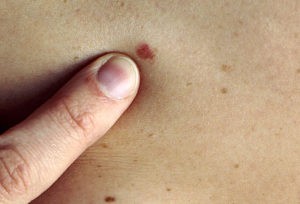A case of a 32-year-old male is presented in which DCA therapy, with no concurrent conventional therapy, resulted in regression and stabilization of recurrent metastatic melanoma (mel.) for over 4 years’ duration
I will be direct. The five-year survival rate for malignant melanoma, or stage 4 melanoma, is grim. According to research, melanoma that has metastasized has is between 15-20%. Once a melanoma has spread beyond the original site, conventional oncologic therapies offer the advanced mel. patient little hope.

This blog post then is about dichloroacetate (DCA) as an evidence-based therapy that may be able to offer the metastatic melanoma patients therapy options. According to the articles linked and excerpted below, DCA is both a stand alone therapy as well as an integrative therapy for metastatic melanoma.
If a patient is considering immunotherapy please read the article linked below that talks about the ability of probiotics to enhance the efficacy of immonotherapy. Further, consider other complementary therapies such as nutrition and supplementation before, during and after active therapies.
In short, a poor prognosis, conventionally speaking, doesn’t necessarily that the patient must give up hope. I was diagnosed with incurable cancer with a poor prognosis back in 1994. Our challenge is to think outside the conventional oncology box.
Remember that conventional oncology can’t cure multiple myeloma. Understand that conventional chemotherapy and radiation cause short, long-term and late stage side effects.
Have you been diagnosed with metastatic melanoma? Please scroll down the page, post a question or comment and I will reply to you ASAP.
Thank you,
David Emerson
- Cancer Survivor
- Cancer Coach
- Director PeopleBeatingCancer
Recommended Reading:
Melanoma, also known as malignant mel., is a type of cancer that develops from the pigment-containing cells known as melanocytes.[1] Melanomas typically occur in the skin, but may rarely occur in the mouth, intestines, or eye…
“Sodium dichloroacetate (DCA) has been studied as a metabolic cancer therapy since 2007, based on a publication from Bonnet et al demonstrating that DCA can induce apoptosis (programmed cell death) in human breast, lung, and brain cancer cells. Classically, the response of cancer to a medical therapy in human research is measured by Response Evaluation Criteria for Solid Tumours definitions, which define “response” by the degree of tumor reduction, or tumor disappearance on imaging, however, disease stabilization is also a beneficial clinical outcome. It has been shown that DCA can function as a cytostatic agent in vitro and in vivo, without causing apoptosis. A case of a 32-year-old male is presented in which DCA therapy, with no concurrent conventional therapy, resulted in regression and stabilization of recurrent metastatic melanoma for over 4 years’ duration, with trivial side effects. This case demonstrates that DCA can be used to reduce disease volume and maintain long-term stability in patients with advanced mel.”
“We aimed to verify if there is evidence to consider dichloroacetate (DCA), which inhibits the pyruvate dehydrogenase kinase (PDK) and reverts the metabolic shift of cancer cells from glycolysis to oxidative phosphorylation, as a promising drug for therapy of cutaneous melanoma (CM) patients.
RESEARCH DESIGN AND METHODS: We assessed the expression profile of PDK 1, 2 and 3 in a series of mel. samples, to verify if mel. tumors express the DCA targets if this expression correlates with the activation of important signaling cascades for melanoma genesis and also with the prognosis of mel. patients. We also established the sensitivity of mel. cell lines to DCA treatment, by assessing their metabolic alterations, proliferation, and survival.
RESULTS: We observed that both PDK 1 and 2 isoforms are overexpressed in CM compared to nevi, this expression being associated with the expression of the mTOR pathway effectors and independent of the BRAF mutational status. Mel. cell lines treated with DCA showed a shift in metabolism, that is, a decrease in glucose consumption and lactate production, downregulation of proliferation, an increase of apoptosis and a decrease in mTOR pathway activation.
CONCLUSION: Our results suggest that PDK expression may play a role in mel. development and that DCA can be useful for CM therapy, alone or in combination with mTOR inhibitors.
“Conclusions-These results suggest that DCA potentiates the effect of vemurafenib through a cooperative attenuation of energy production. Furthermore, the demonstration of retained sensitivity to DCA in mel. cells with acquired resistance to vemurafenib could have implications for mel. treatment…”




